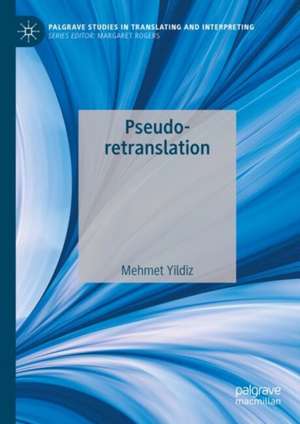Pseudo-retranslation: Palgrave Studies in Translating and Interpreting
Autor Mehmet Yildizen Limba Engleză Hardback – 28 aug 2024
Din seria Palgrave Studies in Translating and Interpreting
- 8%
 Preț: 601.11 lei
Preț: 601.11 lei - 20%
 Preț: 816.68 lei
Preț: 816.68 lei - 9%
 Preț: 1608.11 lei
Preț: 1608.11 lei - 15%
 Preț: 645.60 lei
Preț: 645.60 lei - 18%
 Preț: 942.01 lei
Preț: 942.01 lei - 18%
 Preț: 777.83 lei
Preț: 777.83 lei -
 Preț: 483.12 lei
Preț: 483.12 lei -
 Preț: 385.84 lei
Preț: 385.84 lei -
 Preț: 424.61 lei
Preț: 424.61 lei - 18%
 Preț: 726.06 lei
Preț: 726.06 lei - 18%
 Preț: 731.41 lei
Preț: 731.41 lei -
 Preț: 453.01 lei
Preț: 453.01 lei - 15%
 Preț: 637.78 lei
Preț: 637.78 lei - 15%
 Preț: 562.00 lei
Preț: 562.00 lei - 18%
 Preț: 950.33 lei
Preț: 950.33 lei - 18%
 Preț: 731.73 lei
Preț: 731.73 lei - 18%
 Preț: 731.10 lei
Preț: 731.10 lei - 18%
 Preț: 950.96 lei
Preț: 950.96 lei - 15%
 Preț: 636.80 lei
Preț: 636.80 lei - 15%
 Preț: 644.30 lei
Preț: 644.30 lei -
 Preț: 386.22 lei
Preț: 386.22 lei - 18%
 Preț: 948.47 lei
Preț: 948.47 lei -
 Preț: 387.58 lei
Preț: 387.58 lei - 15%
 Preț: 580.36 lei
Preț: 580.36 lei -
 Preț: 379.09 lei
Preț: 379.09 lei - 18%
 Preț: 1402.23 lei
Preț: 1402.23 lei - 18%
 Preț: 781.77 lei
Preț: 781.77 lei - 15%
 Preț: 642.68 lei
Preț: 642.68 lei - 15%
 Preț: 644.95 lei
Preț: 644.95 lei - 15%
 Preț: 640.55 lei
Preț: 640.55 lei - 15%
 Preț: 696.18 lei
Preț: 696.18 lei - 15%
 Preț: 636.45 lei
Preț: 636.45 lei -
 Preț: 484.69 lei
Preț: 484.69 lei - 15%
 Preț: 645.14 lei
Preț: 645.14 lei
Preț: 318.07 lei
Nou
Puncte Express: 477
Preț estimativ în valută:
60.88€ • 62.74$ • 51.40£
60.88€ • 62.74$ • 51.40£
Carte disponibilă
Livrare economică 08-22 februarie
Preluare comenzi: 021 569.72.76
Specificații
ISBN-13: 9783031645136
ISBN-10: 3031645138
Pagini: 144
Ilustrații: Approx. 145 p. 60 illus.
Dimensiuni: 148 x 210 mm
Greutate: 0.33 kg
Ediția:2024
Editura: Springer Nature Switzerland
Colecția Palgrave Macmillan
Seria Palgrave Studies in Translating and Interpreting
Locul publicării:Cham, Switzerland
ISBN-10: 3031645138
Pagini: 144
Ilustrații: Approx. 145 p. 60 illus.
Dimensiuni: 148 x 210 mm
Greutate: 0.33 kg
Ediția:2024
Editura: Springer Nature Switzerland
Colecția Palgrave Macmillan
Seria Palgrave Studies in Translating and Interpreting
Locul publicării:Cham, Switzerland
Cuprins
Chapter 1: Introduction.- Chapter 2: Academic Texts and Intertextuality.-Chapter 3: Need for A New Conceptualisation: Why Pseudo-Retranslation?.- Chapter 4: Pseudo-Retranslation: A New Phenomenon of Translational Intertextuality.- Chapter 5: Methodology.- Chapter 6: Case-based Results.- Chapter 7: Conclusion.
Notă biografică
Mehmet Yildiz is an Associate Professor of Translation Studies in the Department of English Language and Literature at Canakkale Onsekiz Mart University, Turkey.
Textul de pe ultima copertă
This book presents pseudo-retranslations as a new phenomenon of translational intertextuality, revealing how pseudo-retranslations establish large networks of intertextuality across academic works, how academic authors have recourse to this procedure as they create their academic texts, and how pseudo-retranslations contribute to the dissemination of flawed scientific knowledge. Pseudo-retranslation can be defined as an academic author’s partial or complete exploitation of another academic author’s translation and presenting it as a retranslation of the source text. This phenomenon, first documented in Yildiz (2021), arises from academic authors’ failure to refer to or translate primary sources – particularly in English. Since there occurs no actual retranslation process, this procedure is called pseudo-retranslation. Using a range of academic texts from the Turkish context as case studies, the author presents the integral constituents of this phenomenon, and the behavioural patterns of its renderers. This book will be of particular interest to academics and postgraduates in the field of translation studies and (corpus) linguistics.
Mehmet Yildiz is an Associate Professor of Translation Studies in the Department of English Language and Literature at Canakkale Onsekiz Mart University, Turkey.
Mehmet Yildiz is an Associate Professor of Translation Studies in the Department of English Language and Literature at Canakkale Onsekiz Mart University, Turkey.
Caracteristici
Identifies and characterises a new translational phenomenon observable in academic works Offers a new theoretical framework that will allow researchers to problematise intertranslational appropriations Incorporates a corpus research methodology by using R
